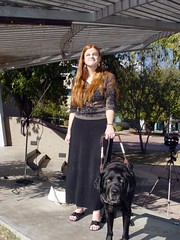 The time has come to say goodbye to an old friend. The CTL website has long served us well, but as with everything else it needed an upgrade. Welcome to the new site! Let us know what you think and how we can make it better!
The time has come to say goodbye to an old friend. The CTL website has long served us well, but as with everything else it needed an upgrade. Welcome to the new site! Let us know what you think and how we can make it better!
– The CTL

What does it mean to value differences at Mesa? This semester the CTL is hosting the district training series MOSAIC: Maximizing Our Strength as An Inclusive Community series.
Beginning Friday February 4 Mosaic IA will be offered to all employees. Read the testimonies of those who have gone through MOSAIC training and details of the program. Join your colleagues as we learn about ourselves, being a member of an inclusive environment, learn necessary skills for communication, and more.
Register today!
One of the RSS feeds I subscribe to, Make Use Of, posted a link to a bunch of Physics Games.
I'd like you to meet someone:

This is Sarah Outwater, a young woman who has been blind since she was 3 years old. She's a cancer survivor (metastatic retinoblastoma) and has been in her condition ever since she had surgery on her eyes to protect her from the deadly disease.
I was invited to participate in a charity project for a little girl she had heard of on the news who was in a similar condition as she was at her age, except technology has advanced and this little girl (last I heard) was free of her cancer and still able to see.
Sarah is an extremely intelligent girl and can play several different musical instruments and uses technology to support her education and professional career goals. In her charity project, she was compiling a music album and asking for donations to help the family of the girl who was receiving cancer treatments. As part of my donation, I offered to build a web site and create/donate some multimedia presentations for benefit concerts and post them on the website (This was before I heard of YouTube). Sarah brought her laptop to my workplace and we cut some video interviews together and I showed her how to edit content for the website. Later we were joking together in a group meeting about how people and technology interact. I made the quip that people who talk to their technology to get it to do obscure things are borderline bonkers, and she retorted "well that's nothing. My technology talks to me!"
Of course it was true. In our interactions for her laptop was equipped with screen reading technology that allowed her to complete her work for school and work on her music projects. This is a prime example of adaptive use of technology for a population that predominantly gets their work done despite the fact that they can't see what they are doing.
However, that's not the only way people who can't make use of their eyes to do their work continue to survive. They must be able to use their other senses. Audio alone in my humble opinion is not the savior of interaction with technology. People must be able to use their other senses too. Which of the remaining 4 senses makes the most sense for HCI for blind people? Touch or tactile surfaces is what's coming to mind.
Here is something that Macrodobia (Adobe the company and Macromedia's Technology) have been pushing for a while…the idea that consistent technology for authoring multimedia content be available on a multitude of devices. What this means is that soon someday we will be seeing flash on tons of personal handheld devices.
I also suspect we will see flash interfaces on other devices too such as kitchen appliances and home entertainment center components. Even more sobering would be to see it in public facilities and transportation devices such as elevators.
Adobe is really pushing their flash platform which is really good for people like me who enjoy learning about their platform. What I would really like to see is an concerted effort to research what accessibility options exist for persons who can't use their eyes to interact with interfaces that will potentially be flat and non-tactile.
Even Apple's iPhone with all its glitz and glory has its issues. How does a person who can't see be excited about an iPhone for their communication needs? Sarah had no problem using her cell phone to communicate, and could very easily find the buttons to push because she could feel them with her fingers. Voice activation is probably on the horizon and may become mandatory for devices using these interfaces, and I will be waiting to see what advances are on their way with Adobe's technology.
I came across this article and wondered about the implications. With all the negative press about athletes using performance-enhancing drugs for their line of work/play, how many of us see our brains like we do our muscles? I have personal convictions that our brains can be exercised just like the rest of our bodies, and if people truly saw our physical bodies as something to be cherished and used appropriately, the competitive edge would be based on the greater good of people and less selfish.
(more…)
Last week was a historical week. Ken Costello has been a fixture at Mesa for many years and has been influential in my education ever since I was a student technology assistant back in the late 90’s.

Back then I knew him as the multimedia guy and when I got hired on full time for fall of 2000, I’ve been working around him professionally ever since. Ken retired officially from the college and working in the CTL on April 4 and we are sad to see him go. He’s had many influential clients that have come to him for advice and innovative development through the CTL and also for other college events throughout his tenure here. If you didn’t get a chance to make it to the reception held for him at the CTL check out these pictures hosted on our flickr account!
I’ve been reading Bob Cringely’s column ever since I discovered he was the person behind one of my favorite PBS documentaries, “Triumph of the Nerds” which is a history of personal computing. Last week he posted an article about how the later generations of our students who are beginning to perceive that there was no life prior to computers, perhaps much in the same way my generation perceives television. What will our children’s children be experiencing in their learning opportunities?
(more…)
Many readers might have wondered where we were during the posts in between November and the start of Spring Semester. We had a little challenge with our blog software, but we are obviously back online now, thanks to James Bowles who has been serving as our new Systems Administrator.
As for myself, I’ve been very busy since returning to the CTL after a semester-long sabbatical leave to finish a master’s degree in Educational Technology at ASU. It’s done and I’m back and although I’ve been really struggling to find time to do everything I want to as well as serve the needs of the CTL faculty it’s been fun.
(more…)
 The time has come to say goodbye to an old friend. The CTL website has long served us well, but as with everything else it needed an upgrade. Welcome to the new site! Let us know what you think and how we can make it better!
The time has come to say goodbye to an old friend. The CTL website has long served us well, but as with everything else it needed an upgrade. Welcome to the new site! Let us know what you think and how we can make it better!

